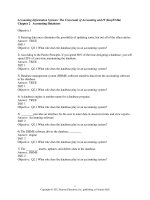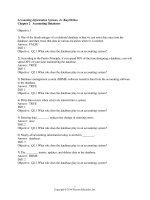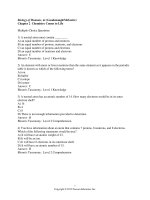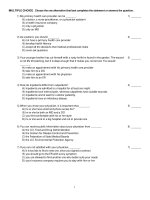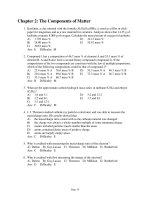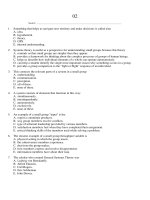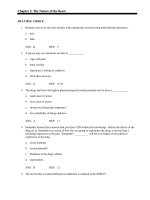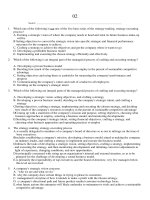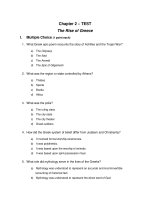Empowerment series the skills of helping individuals families groups and communities 8th edition shulman test bank
Bạn đang xem bản rút gọn của tài liệu. Xem và tải ngay bản đầy đủ của tài liệu tại đây (126.72 KB, 4 trang )
Chapter 2
Oppression Psychology, Resilience, and Social Work Practice
Multiple Choice Questions
1.
The “buffering hypothesis” is best exemplified by?
a.
an ability from infancy on to gain other’s positive attention
b.
sporadic nurturing during the first year of life.
c.
the absence of role models.
d.
all of the above
ANS: A
2.
PG:
58
EPAS: 2.1.6b
PG:
63
EPAS: 2.1.3a
An example of Fanon’s concept of “radicalization” by the women in the Survivors
of Sexual Abuse case is the group’s decision to:
a.
join a “Take Back the Night” march
b.
create group rules
c.
write letters to their abusers
d.
seek individual therapy
ANS: A
5.
EPAS: 2.1.3a
The use of support groups for the geriatric population illustrates how a social
work program can:
a.
help decrease adaptive capacity
b.
strengthen cognitive hardiness in the face of loss.
c.
strengthen professional bonds
d.
A&B
ANS: B
4.
57
Which of the following is NOT a finding in the Werner study?
a.
Successful adaptation depends on professional intervention.
b.
When stressful events outweigh the protective factors, even the most
resilient child can have problems.
c.
High-risk children can grow up to be competent adults
d.
As long as the balance between stressful life events and protective factors
is favorable, successful adaption is possible
ANS: C
3.
PG:
PG:
53
EPAS: 2.1.4a
All of the following are FALSE except:
a.
Having fixed views about issues of oppression aid in understanding
clients.
b.
It is not necessary to be culturally competent to do good practice.
c.
Thinking broadly about issues of oppression aid in understanding clients.
Test Bank-1
d.
ANS: C
6.
.
PG:
65
EPAS: 2.1.3b
PG:
51
EPAS: 2.1.4b
PG:
62
EPAS: 2.1.6b
The two types of reserve capacity are:
a.
baseline and environmental
b.
buffering and developmental
c.
baseline and developmental
d.
evaluative and developmental
ANS: C
10.
EPAS: 2.1.7a
Based on Tanner’s work, a good starting point for social workers working with
older people is:
a.
to help their families accept eventual loss.
b.
to help them plan for the future.
c.
to focus on the client’s present lives.
d.
none of the above
ANS: C
9.
51
Repeated exposure to oppression, subtle or direct, may lead vulnerable members
of an oppressed group:
a.
internalize the negative self-images projected by the external oppressor
b.
internalize the conflict of their family
c.
to the contemplation stage of acceptance
d.
none of the above
ANS: A
8.
PG:
In the Geriatric Reminiscence Group the leader needed to learn which of the
following?
a.
the idiosyncrasies of all group members.
b.
how to take control of the group
c.
how to side step issues.
d.
the “language of the group”.
ANS: D
7.
The relationship between oppression and resiliency is most helpful during
the contracting stage of the work.
PG:
61
EPAS: 2.1.3a
Franz Fanon is credited with which of the following theories?
a.
domination theory
b.
social learning theory
c.
oppression theory
d.
feminist theory
Test Bank-2
ANS: C
PG:
50
EPAS: 2.1.4a
11.
Life stressors can lead to negative outcomes for people at high risk, however,
______ and ______ factors can help to provide the resilience to overcome adversity.
a.
familial and environmental
b.
personal and environmental
c.
community and personal
d.
relational and contextual
ANS: B
12.
PG:
52
EPAS: 2.1.4b
PG:
62
EPAS: 2.1.3a
According to Bulhan (1985), the six indicators of oppression are violations of:
a.
space, time, ideas, mobility, bonding, and identity
b.
person, time, energy, mobility, bonding, and identity
c.
space, time, energy, mobility, bonding, and procreation
d.
space, time, energy, mobility, bonding, and identity
ANS: D
15.
EPAS: 2.1.3b
Life-span theory suggests that the development throughout life is characterized by
the joint occurrence of increases (____), decreases (____), and maintenance
(____) in adaptive capacity.
a.
gains, losses, consistency
b.
gains, losses, stability
c.
gains, losses, predictability
d.
gains, transitions, stability
ANS: B
14.
58
When we work with people “like us”, this is referred to as:
a.
intercultural practice
b.
intracultural practice
c.
extracultural practice
d.
cultural competence
ANS: B
13.
PG:
PG:
53
EPAS: 2.1.34a
The worker in the case example Battered Women and Indicators of Oppression
uses which skill?
a.
empathy
b.
humiliation
c.
exception questions
d.
contracting
ANS: A
PG:
53
EPAS: 2.1.4a
Test Bank-3
True or False Questions
16.
Resilience theory does not apply only to children and families.
ANS: T
PG: 61
EPAS: 2.1.3a
17.
The life-span theory argues that as reserve capacity decreases, so does the
potential for positive plasticity.
ANS: F
18.
EPAS: 2.1.3b
PG:
56
EPAS: 2.1.3a
Focusing on resilience in individuals lends to both preventive and diagnostic
approaches to clients.
ANS: F
20.
61
All children who experience trauma have negative developmental outcomes.
ANS: F
19.
PG:
PG:
57
EPAS: 2.1.3b
Oppression psychology is a theory of the impact of societal oppression on
vulnerable populations.
ANS: T
PG:
50 and Glossary
Test Bank-4
EPAS: 2.1.4a
